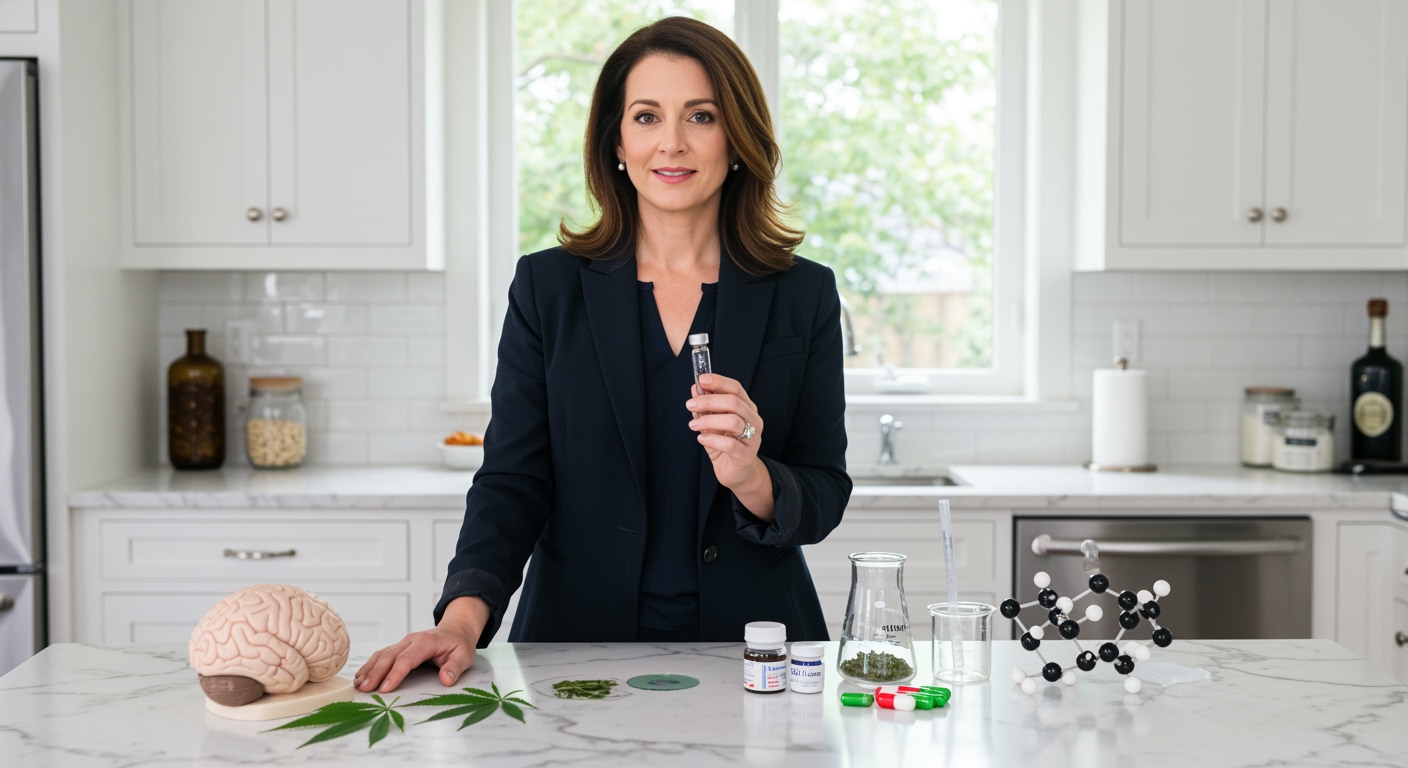✪ Key Highlight: Cannabis compounds CBD and THC show promise for reversing brain aging and extending lifespan in animal studies.
Introduction
Scientists have discovered something remarkable about cannabis that could change how we think about aging.
A comprehensive review of 18 studies published between 2008 and 2023 reveals that cannabis compounds like CBD and THC might actually help slow down the aging process and protect our brains as we get older.
Hi, I’m Abdur, your nutrition coach and today I’m going to analyze this groundbreaking research on how cannabis compounds could revolutionize healthy aging and brain protection.
What Did Animal Studies Reveal About Cannabis and Aging?
The animal research results were nothing short of extraordinary.
Mice, worms, fruit flies, and zebrafish that received cannabis compounds lived longer than their untreated counterparts.
These animals also showed better learning abilities and significantly less inflammation throughout their bodies.
The most impressive findings came from German researcher Andreas Zimmer and his team at University Hospital Bonn and Hebrew University of Jerusalem.
They discovered that low doses of THC could actually reverse signs of brain aging in mice.
THC worked by boosting activity at the CB1 receptor, which is a crucial part of the brain’s endocannabinoid system that controls learning, memory, and neuron survival.
✪ Fact: The endocannabinoid system exists naturally in our bodies and helps regulate mood, memory, and inflammation.
How Do Cannabis Compounds Affect Brain Aging Mechanisms?
The research revealed fascinating details about how cannabis compounds work at the cellular level.
Scientists found that THC helps regulate a protein called mTOR, which plays a critical role in cell growth, metabolism, and aging.
As we age, mTOR signaling can become disrupted, leading to cognitive decline and memory problems.
THC appeared to restore proper mTOR activity in aging mice, which improved their cognitive performance dramatically.
This discovery suggests that cannabinoids could offer new therapeutic pathways for protecting the brain as it ages.
The researchers believe that by targeting both the endocannabinoid system and the mTOR pathway, cannabis compounds like THC could provide dual protection against age-related brain decline.
✪ Note: mTOR is often called the master regulator of aging because it controls how cells respond to nutrients and stress.
What Do Human Studies Show About Cannabis and Aging?
The human research presents a much more complicated picture than the animal studies.
Some studies found that cannabis might actually damage memory in people, while others suggested it could protect against cognitive decline.
One study linked long-term recreational cannabis use with lower executive function and slower processing speed in older adults.
However, a Canadian study published in Drugs & Aging found that older adults using medical cannabis reported significant benefits for pain, sleep, anxiety, and mood.
These same participants did experience some side effects, showing that cannabis affects different people in different ways.
The mixed results in human studies highlight the complexity of how cannabis interacts with our bodies and the importance of factors like dosage, frequency of use, and individual differences.
✪ Pro Tip: The difference between medical and recreational cannabis use may significantly impact health outcomes and side effects.
Can Cannabis Help With Age-Related Diseases Like Dementia?
Scientists are actively exploring whether cannabis compounds can help treat specific age-related diseases.
At the University of Kentucky College of Medicine and the Sanders-Brown Center on Aging, researchers are conducting trials to see if THC and CBD can help people with late-stage dementia.
These studies aim to determine whether cannabis compounds can ease symptoms or slow disease progression in dementia patients.
The research is particularly important because the number of older adults using cannabis for medical reasons continues to rise rapidly.
One of the main reasons scientists are interested in cannabis is its ability to reduce chronic inflammation, which is a major driver of aging and many diseases including Alzheimer’s and Parkinson’s.
A recent study using aged rats found that chronic exposure to a cannabis extract called Cannabixir Medium Flos appeared to restore some brain features typical of younger animals.
The treated rats had less neuroinflammation and healthier brain cells, though researchers cautioned that these results are still preliminary.
✪ Fact: Chronic inflammation in the brain is linked to nearly all neurodegenerative diseases including Alzheimer’s and Parkinson’s.
What Are The Limitations and Concerns?
Scientists are urging caution despite the promising animal research results.
The effects seen in animals may not always translate to humans, and cannabis can have significant side effects, especially with long-term or high-dose use.
The researchers behind the UK review emphasized that much remains unknown about how cannabis affects aging in people.
Individual responses to cannabis can vary widely based on genetics, age, health status, and other medications.
The review excluded studies focused on short-term effects of cannabis or its use in treating specific medical conditions.
Instead, it looked specifically for evidence on how cannabinoids might influence the basic biology of aging and longevity.
The authors found that while there is early evidence for anti-aging effects in animals, human data remains limited and sometimes contradictory.
✪ Note: Cannabis affects everyone differently due to variations in endocannabinoid system sensitivity and metabolism.
The Bottom Line
The animal research on cannabis and aging shows remarkable promise, but we need much more human research before drawing definitive conclusions.
Cannabis compounds may hold the key to healthier aging, but the human body is far more complex than any laboratory model can capture.
I would love to hear your thoughts on this emerging research – do you think cannabis could become a legitimate anti-aging therapy, or are you concerned about the potential risks and unknowns?
References
At NutritionCrown, we use quality and credible sources to ensure our content is accurate and trustworthy. Below are the sources referenced in creating this article:
- ScienceAlert: Compounds in Cannabis Promote Healthy Aging, New Study Discovers
- Lifespan.io: Cannabis as a Treatment for Age-Related Diseases
- PubMed: Cannabis and Aging Research Study
- University of Kentucky Medicine: Cannabis and Late Stage Dementia Study





